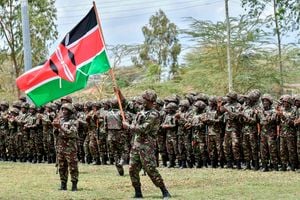Kenya’s first policewoman at ease in uniform

JOSEPH KANYI I nation
Ms Elizabeth Nyaruai, 82, the first African policewoman in Kenya.
What you need to know:
- Mother of four served force for five years leaving in 1956 after she was suspected of taking an oath
At 82 years, Ms Elizabeth Nyaruai Macharia walks with a surprisingly straight back and a barely noticeable limp.
She is of good cheer and her memory, though fading, is still better than that of many of her age mates.
“I owe it all to God and the scouting movement, whose demand for exercise has kept me in good health and spirits,” says Mrs Nyaruai who is a farmer at Charity Village in Endarasha, Nyeri County.
Indeed, Mrs Nyaruai wears many hats, but she is most proud of her long involvement in the scouting movement.
And her love of the movement made her donate two acres out of her 89-acre land, to the Kenya Scouts and Girl Guides Association 15 years ago. It’s a donation that has caused a lot of distress to her though.
She complains it took too long for the movement to formally take up her offer by facilitating the change of ownership. Even more time has elapsed before the equal and separate parcels were transferred to the Kenya Scouts Movements and the Kenya Girl Guides Association.
When she visited the Nation’s offices in Nyeri, she was angry that some people had recently cut some trees in the plot, saying it was the beginning of a move to grab the plots.
She said she had asked the movement management to hatch a project that could help scouts in the area and suggested that they could rear dairy cattle in the plots.
Mr Peter Kimita, the Scouts Association’s assistant commissioner for Central Region acknowledges Mrs Nyaruai’s concerns, adding that he understood her frustrations after a noble gesture.
“We intend to establish campsites for Boy Scouts and Girl Guides in the plots and have recently identified donors in the Netherlands, who will help us put up cottages and sanitary facilities,” said Mr Kimita.
He also says the movement is looking for donors who will help them rehabilitate Mrs Nyaruai’s wooden house.
Mr Kimita admits a lot of time elapsed before the offer was taken up by the association in 2002, but adds he is personally committed to seeing something come up within the lifetime of the old lady.
It is something that will bring cheer to a woman who carries the ideals of scouting high and with an enchanting experience.
When she arrived at Kiganjo Police Training College in 1951 as one of the first African women police recruits, the college did not even have barracks for women.
“I was allocated a three bedroom house called the Sigh Quarters all to myself,” she says with a grin, “and there was a famous announcement during my first parade that any male recruit found near my quarters would be expelled.”
She recalls with nostalgia the daily 10-kilometre pre-parade jog starting at the police college to the present day Nyeri Law Courts and back.
“I never once fainted from exhaustion unlike some of my male colleagues,” she says with dignified boast.
The mother of four served the force for five years leaving in 1956 during the height of the Mau Mau war after she was suspected of involvement in the outlawed communal oathing.
She vividly recalls how she joined the police force. In 1951, she had just finished secondary school and teacher training at Gateiguru Secondary in Mugoiri, Murang’a, and had been posted to teach at Ngorano Primary School in Mathira.
She and colleagues saw a Kenya Police ad for female police recruits as they read a newspaper during tea break. Many months later after she wrote an application, five white police arrived at the school in Land Rover to pick her up for training.
“As the police van rounded a bend to enter the school gate, we had joked that there was a criminal in our school. Immediately the five officers disembarked and asked for me.”
Mrs Nyaruai remembers the five officers whispering among themselves: “She is fit.”
And off they went to start her course. “It would mark the beginning of my obsession with the uniformed forces,” she says.




